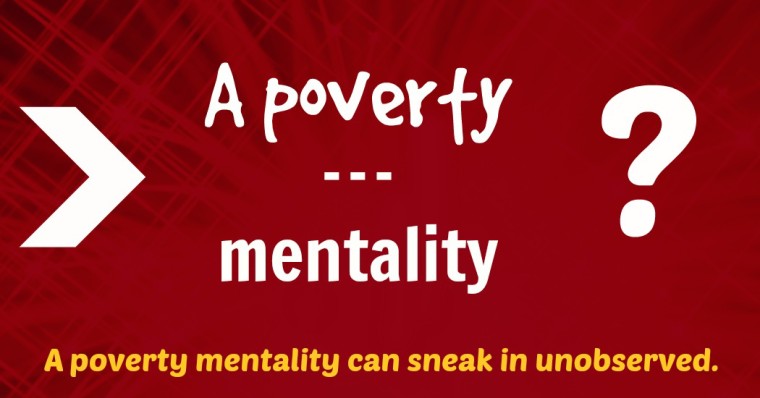
The other day I was thinking about a story I’d just heard where a woman spoke about her break with poverty after being raised in project housing in the United States. The question was asked of her, “What was Christmas like for you as a child?” Her response, “Christmas came twelve times a year, every time that mysterious check arrived in the mail.” Growing up in this system, she had believed that somehow there was always a check that would magically arrive in the mail, and they would have money to burn. She believed that was how everyone lived.
Later on I was reading a book where the author, an autistic grown-up, mentioned parents who depend on government assistance because of their child’s extra needs (autism or other disabilities) and how that keeps these same people from breaking out and pursuing an independent future because they do not want to lose the extra income (there are income ceilings relative to earnings). The author was encouraging people to take charge of their lives for their own personal health and their family’s well-being. Again, it got me to pondering about this idea of “poverty mentality.” Is there such a thing?
In 1995, I was sitting in a secular graduate level university class on multicultural education when the professor said he would be sharing something with us that we should know about even though he wasn’t sure if he actually believed in it. He placed a sheet of paper on the overhead projector’s glass and then proceeded to draw a line dividing the paper in half. As he spoke, we would place ourselves on one side of the dividing line according to our socioeconomic backgrounds. Unbeknownst to me at the time, his lecture would impact me and would help release me from some wrong conclusions.
Professor C. said to us that there is a theory that maintains that people who are raised in poverty in the United States often have a different outlook on life than the person who is not raised in poverty. They look at life from a negative, deficit position rather than from a positive, self-motivated position . They are more likely to blame others for their unhappiness and problems whereas the person on the opposite end of the spectrum is more likely to blame themselves for their unhappiness and problems. He started writing down a ledger of opposites that characterize the two groups. The defining issue is in regard to “who” each group believes is responsible for their well-being.
The person with a poverty mentality expects someone else to help them with their needs and to take care of them in their future. They see themselves in the negative and believe it is someone else’s fault. On the other side of the equation, the person from middle America expects to take care of themselves, they believe they should have goals, and they believe it is up to them to make something of their life.
It was a light bulb moment for me. I suddenly saw something come into focus that never made any sense to me before. It helped me understand myself more clearly and also my mate with more clarity. In our childhoods, we had been raised in the two opposite scenarios. The way I was raised, I knew it was up to me to make my own way and to do well with my life. Early in our marriage, I realized I was married to someone who did not have personal goals; it became increasingly evident that he lacked material and futuristic (employment) ambitions. This was of great frustration to me (and, consequently, him). It was through my encouragement and insistence that my mate completed a college degree. Ownership or lack of ownership of individual problems was another factor that cycled back to our rearing and mind-sets.
Until Dr. C. made his comments, I was in the dark as to how much my mate and our differing cultural backgrounds were impacting our life and our future, this being one aspect of the disconnect. We had four children at the time, and I was working hard to improve our lives so we would have a better future. The thought clicked, and I “got it.” It helped me understand one piece of the puzzle, the “why.”
I have been mulling this over, the mentality of poverty and how it relates to me and to others. Some of us have threads of this way of thinking running in and out of our lives. We tend to look at the wrong that is happening, or we blame others for what somewhat belongs to our poor planning or actions, and we expect others to meet our needs rather than ourselves. We get tired, worn-out, burdened, and angry at times. Christians often see life through a deficit lens. It seems to me that we shouldn’t be this way, that our lives should be different even in the times of severe testing and trials.
Another story. A few years back in a city not far from where I live, teachers became aware of a family in their school who lived without a working refrigerator. The teachers pooled their resources to buy the family a new, much needed refrigerator. The following week the children from this family didn’t show up at school. Where could they be? Come to find out, they sold the new refrigerator and took a vacation (I think it was to Disneyland). Here was their opportunity. The poverty mentality came into play. It is a shocking story, in a way. Their reality and view on life dictated their choices.
It is my conclusion that our spiritual lives reflect our poverty or abundance mentality. We can see God like that family did, as the “Great Benevolent Benefactor” rather than as our Savior, Companion and Guide. We either see God as being enough or we see Him as withholding the good stuff from our lives. Copious complaining is evidence of a poverty mentality (thinking we deserve better and more). God is either enough or He isn’t enough. What is our true view?
The more I have thought about this poverty mentality, the more I have come to the conclusion that this form of thinking is becoming more pervasive in our culture and not so related to socioeconomic cultural views. Even the government itself promotes this way of thinking in our people’s lives. I see it in our young people, not just those we might say come from disadvantaged situations. It is limiting. I know it is a theory, but there is evidence that we choose our path, or at least our reactions to the occurrences on the path. For the Christian, our “poverty” thinking may be limiting our spiritual potential. I see this in myself as well. Life has never come easy for me. I can let it get me down or stop me from even trying. I suppose it is the poverty mentality barrier that motivational speakers and writers are trying to remove in order to help us see life from an unencumbered viewpoint.
Sometimes we must make ourselves change that which is not right in our spiritual lives. I find that it is helpful to focus my full attention on aspects of God through prayer, fasting, or meditation. I will describe a discipline that may be helpful to you in focusing your being fully centered in God. One must have a measure of depth with God to be able to rest and wait in God. God desires closeness with us. Through Centered Prayer we are able to draw closer to Him and in our desire for Him. A poverty mentality is incompatible with this form of focused prayer.
Centered Prayer: I challenge you to take twenty minutes today. Get alone where you will be not be distracted by anything or anyone. Do these things.
CENTERED PRAYER
- Sit tall, rest your back against a wall or headboard.
- Choose a 1-4 syllable word or phrase i.e. Father God, God alone, Jesus Christ, Lord have mercy, God is love, Peace, Joy. Practice saying the word or phrase as you breathe in and then breathe out. Inhale (Lord), exhale (have mercy) as you say the word(s).
- Relax slowly from head to toe. Seek to enter God’s presence by going deeper with Him.
- Repeat your positive spiritual word slowly and repetitively. Focus on it. When your mind drifts, bring it slowly back to this word/phrase.
- Rest in Jesus. Fully place this short word/thought in your mind (the one you picked).
- At the end of the time, slowly say The Lord’s Prayer (Our Father) with all your attention on the phrases.
- Throughout the remainder of the day, repeat the same phrase whenever you find yourself sinking, negative, worried, fearful, or frazzled.
Repeat a time of Centered Prayer two or more times today. Focus completely on this time alone with God. You may be surprised how much this refreshes your spirit. If it is hard work, then it is not being done correctly or you are not ready for it. Centered Prayer should be restful and relaxing.
My references to Centered Prayer find their source in the book Don’t You Belong to Me? written by a monk at New Clairvaux Abbey, Father Paul Jerome. He and I discussed the deeper side of prayer when we informally met a few months ago. He mentioned his book of which I have since purchased. I have found it to be profitable reading.
Note: Centered Prayer is not TM because its root base is in God.
There are many web links concerning poverty mentality. I am including one here for follow-up reading but not as an endorsement for their product offering. Poverty mentality link.





